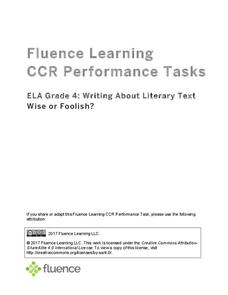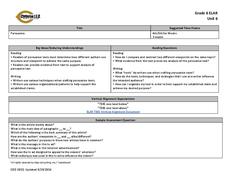Scholastic
Summarizing: Using Hand Motions for Key Words or Points
Learning to summarize texts takes practice. Jump into the training ring and guide your learners through a summarizing practice session. The classic direct instructional practice of "I do, you do, we do" is used to help them identify key...
Curated OER
A Tree Grows in Brooklyn
In this story structure lesson, students read the book A Tree Grows in Brooklyn and identify the characters, setting and main themes of the book. They answer a list of study questions about the book.
Curated OER
Shh! I am Trying to Read!
Students explore the advantages of being able to read silently. They then review a "stuck on a word" strategy using context clues to determine meanings of unknown words. They then practice reading silently and the teacher assesses for...
Curated OER
Shizuko’s Daughter: List-Group-Label Strategy
Help your learners navigate the vocabulary of Shizuko's Daughter by Kyoko Mori with a lesson on categorizing words. After coming up with a list of things that grow from the earth, learners decide which categories each words belong in.
Curated OER
Making Connection, Using Metaphor
Chief Seatle's "Letter to President Pierce, 1855" provides the text for a skills exercise that asks readers to consider how writers use metaphors to contribute to the meaning and impact of a work. Participants then apply what they have...
Curated OER
Monster: Guided Imagery
How would you feel if you were on trial for murder—and you were only 16 years old? Put yourself in Steve Harmon's shoes before reading Monster by Walter Dean Myers. Kids listen to music that fits the theme of the book before listening to...
Curated OER
Phineas Gage: Questioning Strategy
Focus on chapter two of Phineas Gage: A Gruesome but True Story About Brain Science with a questioning activity. After teaching and modeling several types of questions, learners work with partners and then independently to answer and...
Curated OER
The Things They Carried: KWHL
Before beginning The Things They Carried, class members are asked to use a KWHL chart to record what they know about war, what they want to know, and where they might find answers to their questions. Groups then research to topics of...
Novelinks
The Hobbit: Question Answer Relationship
Chapter 12 of The Hobbit provides the text for an exercise that asks readers to use the QAR strategy to develop and respond to questions about story.
California Education Partners
Bud Not Buddy
A two-day assessment challenges scholars to read an excerpt from the story, Bud Not Buddy by Christopher Paul Curtis then complete a series of exercises in preparation for a writing assignment. Day one includes an independent reading...
California Education Partners
We Are The Ship
An assessment sheds light on scholars' ability to read, gather evidence, and draft an original written composition. Learners read an informative text twice before taking notes and discussing their thoughts and textual evidence with a...
Bantam Books
The Tempest: Think-Aloud Annotation
It can be difficult to refer back to a text when analyzing it, so annotation is a great tool for kids to track what they are reading. A thorough and well-organized activity guides learners through the process of annotating William...
Curated OER
Parrot in the Oven: Problematic Situation
Prior to reading Victor Martinez's Parrot in the Oven: Mi Vida, class members are presented with a problematic situation and to rate their responses as well as predict the responses of a character from the novel.
California Education Partners
Letter From Birmingham Jail
To demonstrate their ability to comprehend complex text, ninth graders are asked to craft an essay in which they use evidence drawn from "Letter From Birmingham Jail" to analyze how Martin Luther King, Jr. uses rhetorical devices such as...
California Education Partners
Glass Menagerie
As a reading comprehension assessment, ninth graders are asked to use evidence drawn from The Glass Menagerie to support an analysis of how Tennessee Williams uses specific lines to develop Amanda's character as well as her relationships...
Missouri Department of Elementary
The Clique
Mean girls and bully packs are favorite topic for films and TV shows that focus on the destructive power of cliques. High school freshmen are asked to reflect on both the positive and negative aspects of cliques by reading a short...
Fluence Learning
Writing About Literary Text: Wise or Foolish?
A three-part assessment promotes reading comprehension skills. Class members read literary texts and take notes to discuss their findings, answer comprehension questions, write summaries, and complete charts.
Cleburne Independent School District
Grade 6 English Language Arts and Readiness: Persuasive
What is the best way to compare and contrast viewpoints on the same topic? A persuasive writing unit plan addresses targeted skills, vocabulary, instructional strategies, and suggested resources that would be perfect for developing writers.
Curated OER
Out of the Dust: DR-TA
Encourage good reading habits with an activity that asks class members to examine the title and cover of Out of the Dust, and then make predictions about the setting of and events in the tale.
Public Schools of North Carolina
Math Stars: A Problem-Solving Newsletter Grade 3
Make sure your class stays up with the times using this series of math newsletters. Including word problems that cover topics ranging from consumer math and symmetry to graphing and probability, these worksheets are a fun way to...
Houghton Mifflin Harcourt
One Land, Many Trails: English Language Development Lessons (Theme 5)
English is not the only subject that requires its own set of vocabulary words—geography does too! A series of language development lessons designed to be used with Theme 5: One Land, Many Trails helps introduce readers to key vocabulary...
ReadWriteThink
What is Poetry? Contrasting Poetry and Prose
Introduce middle schoolers to the different strategies used when reading prose versus poetry. Groups use a Venn diagram and a poetry analysis handout to compare the characteristics of an informational text and a poem on the same subject...
Novelinks
The House on Mango Street: Anticipation Guide
Prior to an in-class reading of "What Sally Said" and"Red Clowns," two vignettes from Sandra Cisneros' The House on Mango Street, class members complete an anticipation guide that asks them to agree or disagree with a series of...
Maryland Department of Education
The Concept of Identity Lesson 5: Motivation - Maslow's Hierarchy of Needs
Maslow's Hierarchy of Needs provides the lens class members use to analyze and evaluate the motivations of the characters in Sylvia Plath's "Initiation" and scenes from Mean Girls. Readers then select a character from A Separate...

























